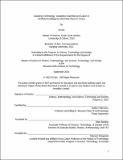Assisting Technology: Disability Expertise and Labor in Artificial Intelligence (AI) Data Work in China
Author(s)
Wu, Di
DownloadThesis PDF (359.3Kb)
Advisor
Helmreich, Stefan
Terms of use
Metadata
Show full item recordAbstract
In recent years, people with disabilities in China have been explicitly enrolled by government programs, corporations, and NGOs to classify and label training data for AI systems. This thesis offers an ethnographic account of one of these programs, combining insights from science and technology studies (STS), critical disability studies, and digital labor scholarship. Run by a disabled persons’ organization (DPO), the examined program is staffed with predominantly blind, low vision, and physically impaired data workers, tasked to sort data for an AI-based internet of things (IoT) system. While existing scholarship on digital labor tend to focus on how technology empowers or exploits disabled people, this thesis asks how disabled people’s labor in turn transforms technology. Centering the experience of disabled data workers and the inner workings of the sociotechnical processes with which they are bound up, I argue that people with disabilities working in AI data annotation effectively assist the technology, not just the other way around.
In this study, the DPO outperformed their non-disabled competitors and became the exclusive contractor of data annotation for a major AI company in China. I show that the obscure and iterative nature of classifying contextless intentions and unclear sound generated by the virtual assistant system necessitates a constant workforce of data annotators, who have rich tacit knowledge, good institutional memory, and a strong working relationship with the developers. Disabled workers in China, pushed out of a wide range of job opportunities due to structural ableism, supplied the initial stability for the AI company. In the meantime, through their disability-informed, non-normative knowledge of flourishing in uninhabitable worlds, or what anthropologist Cassandra Hartblay calls “disability expertise,” disabled workers have reshaped the often-dehumanizing conditions of microwork in the AI data pipeline, pulling many workers to stay and produce higher quality data. An intervention of this article is not only to lay bare the use and abuse of disability as a resource in contemporary AI systems, but also to elevate crip technoscience by teasing out the disability expertise actually entailed in the production of AI.
Date issued
2022-09Department
Massachusetts Institute of Technology. Program in Science, Technology and SocietyPublisher
Massachusetts Institute of Technology